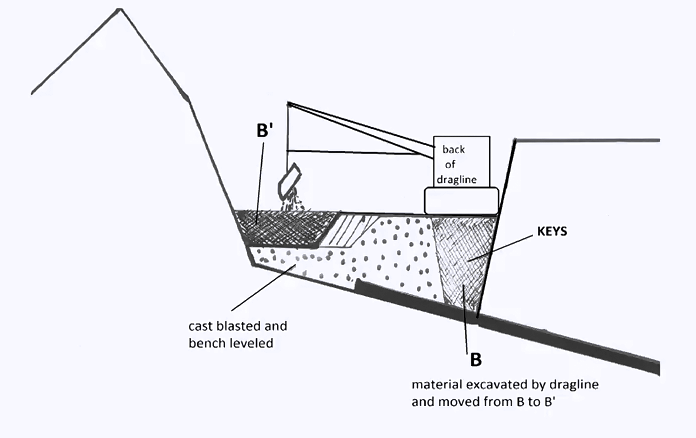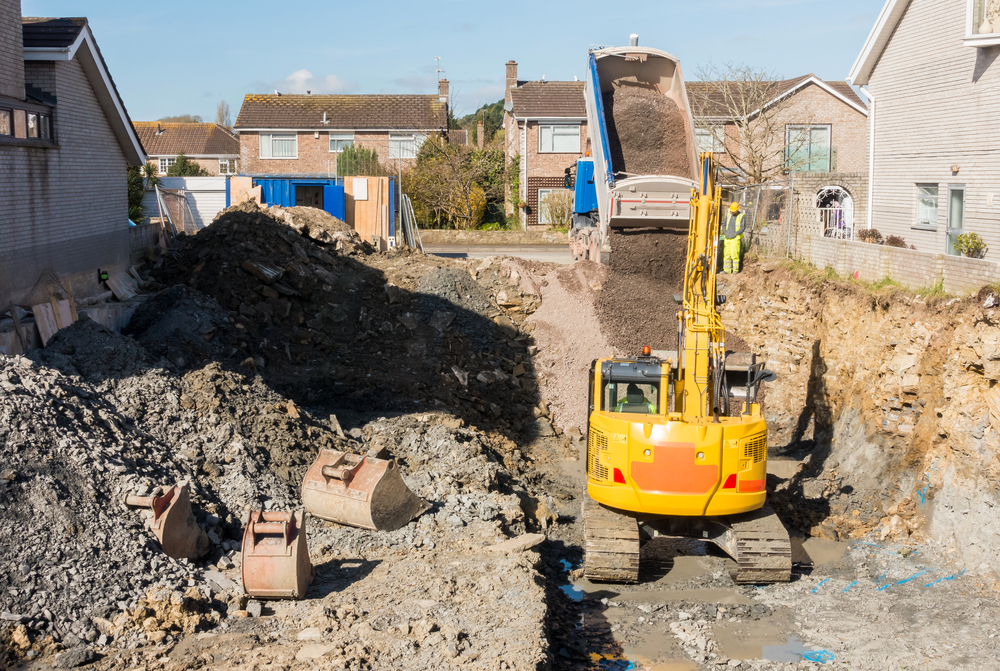The Main Principles Of Demolition
Wiki Article
All About Grading Contractors
Table of ContentsA Biased View of ExcavatorFacts About Mini Excavator UncoveredA Biased View of General ContractorNot known Facts About Concrete ContractorsGeneral Contractor Fundamentals Explained


Scrapers or Pans excavate soil in one area, haul as well as discard the soil in another spot (excavating contractors). It is challenging to match the performance of scrapers for cut/fill soil procedure if the haul range is less after that a mile. Scrapes are normally pulled by a rubber tire wheel tractor as well as are in some cases pushed with the cut location by a bulldozer.
There are often times that scrapes are not used for website grading and a dump vehicle is employed: the haul might be to long, the haul might cross roads where scrapes are not permitted, acid rock may be experienced, equipment schedule, and so on. Unload trucks remain in common use as well as possibly require little conversation.
"Rock body" beds, on the other hand, have no tailgates and can dump any type of size rock, although their volume capability is lessened. Compaction Equipment enhances the density of the dirt and in some instances provides a smooth, rolled surface.
Some Known Details About Excavating Contractors
From an easy test pit to percussion drilling to core drilling the owner has significantly much more pricey choices that produce progressively much better information regarding the site underground. As an example, the Owner on a 100,000 SF building project may accredit twenty boring areas with split spoon soil examples taken till rock is reached and afterwards core examples of rock.Recognizing the kind and top quality of rock (from the core samples) and also area of rock (from the dirts boring) is an actual advantage in jobsite planning. Conversely, the Owner of a 100,000 SF structure might make a decision to wage no geotechnical screening whatsoever. The choice about geotechnical testing is typically made by an Owner with no input from the Building and construction Manager.
The section on Dirts and also Geology assists you understand the terms in the geotechnical report. An expertise of the approximate place of the rock helps the Building Supervisor to plan the series of steps adhering to rock excavation. If rock remains in one edge of a huge building project, for example, the planet excavation could start at the opposite end of the structure in order to start foundation work soonest.
Starting the foundation work early would be an excellent idea if the rock might be gotten rid of by ripping. If the rock is incredibly difficult and also needs significant blasting, it might be sensible to hold structure job up until the blasting is completed. The Construction Manager should work with these types of choices and also utilize all the technological date readily available.
The Facts About Excavator Revealed
Unclassified excavation states that all rock or other unanticipated materials (leaving out unsafe materials) encountered in the sitework will certainly be the responsibility of the Specialist at no adjustment in agreement cost. An unidentified excavation is easier from a book-keeping standpoint and also puts the duty for geotechnical conditions onto the Sitework Professional.It's fantastic what a heavy rain can do to a building task. Prior to the rainfall, the website may be completely dry, hefty tools efficiently moving earth, the various other professions efficiently doing their job.
In most areas of the world, the Construction Supervisor need to bear in mind a basic truth: IT WILL CERTAINLY RAIN. Excellent planning can minimize the damage and disturbance of a heavy rainfall to a jobsite. Commonly the excavation as well as grading is left to the Sitework Professional (and their Foremen is responsible to monitor and guide the hefty devices as well as operators).
Therefore the Construction Manager must be continually conscious of what rain will do to pop over to these guys the job website. It is not uncommon for the Sitework Foreman to function their hefty tools for optimal effectiveness as well as wish it doesn't rainfall. Among the best means to get ready for rainfall is to incline all qualities to drain and also to smooth rolled the surface area before a rain.
Excavator Can Be Fun For Everyone
The Building Supervisor need to be perceptive sufficient to guarantee that heavy rain does not quit working on the job much longer than necessary. Daily conversations with Sitework Foremen might be required to attain this objective. Whenever excavation is needed listed below the existing water table on a project, the procedure of dewatering should be considered.In a truly cohesive soil, the water takes a trip so gradually with the clay or silt that dewatering is not normally essential for the relatively brief time of excavation. Dewatering may be required for a single footing excavation or for a whole project site. One of the most common dewatering techniques are trench drains pipes, deep wells as well as well points.

Ground water infiltration can additionally be reduced by cutoff methods such as sheet piling. The prices for dewatering can be staggering, consisting of equipment service, labor and power (or fuel). High dewatering costs have faded the content earnings margins on far way too many jobs. The lots of variables listed here make the task of estimating dewatering expenses extremely hard, and also really inexact.
This alternative needs to always be considered when examining the prospect of dewatering. Clearly the option is only sensible if gravity can run the water to lower ground. Trench drains pipes can be reduced with a backhoe and also full of a crude, granular material (# 4 rock as an example), but treatment has to be exercised in choosing the water electrical outlet kind and area.
What Does Excavator Mean?
A siphon, by definition, makes use of air pressure to bring water from one altitude, up over an obstacle, to a reduced elevation. The pipelines in a siphon system have to be airtight and also some resourcefulness is often required to entirely load the siphon pipe. The siphon pipe have to be full for the siphon to begin.A deep well contains a pump, tube and also an upright well casing. The pump intake is at the bottom of the well case (typically some crushed rock is positioned down there as a filter tool) (trencher). The water is pumped up the pipe, out of the well covering, and also to a suitable discharge location.
In a crude sand, for example, a huge location can be pumped to near the pump intake elevation. A much less permeable soil, on the various other hand, lowers the efficiency of a deep well. Considering that the pump is generally at the end of the deep well, there are no elevation restrictions because of vacuum lift, and deep wells can pop over to these guys reduce the groundwater over 50 feet.
On the bottom of the wellpoint there is a 2 foot long screen and also shutoff, water jets out of this valve as well as produces a hole into which the wellpoint pipeline can be decreased. This hole is frequently made a bigger diameter (for instance 10 inches) to enable a rugged sand backfill to help filter the water (grading contractors).
Report this wiki page